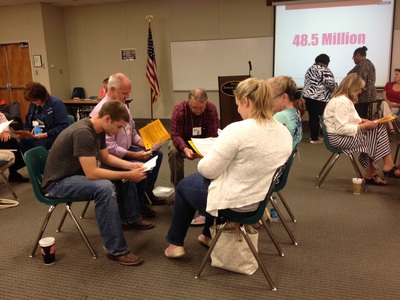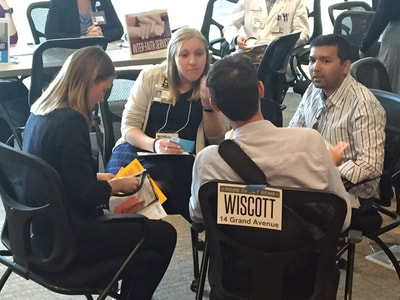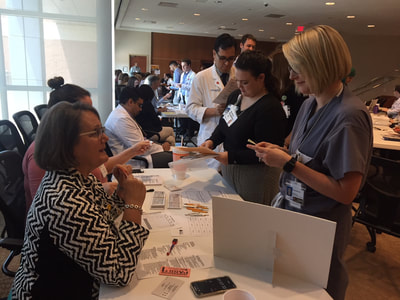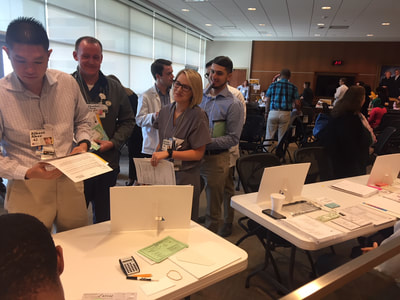Poverty Simulation
|
|
Participants: UT Tyler Nursing, Stephen F. Austin State University, Tyler ISD Early College High School, UT Health Science Center, GCCSA Houston Head Start, Region 7, Westwood ISD, Tyler Junior College LVN, Northeast Texas Public Health District WIC, East Texas Food Bank, St. Paul Children's Foundation, Tyler Junior College Dental Hygiene, Leadership Tyler and multiple public sessions. Annual Outreach: 1,200+ participants, 350+ volunteers! Contact Raven Bagley at raven@ethnn.org to schedule a Poverty Simulation. |
The poverty simulation experience is designed to help audiences begin to understand what it might be like to live in a typical low-income family trying to survive from month to month. It is a simulation, not a game. The object is to sensitize audiences to the realities faced by our low-income neighbors. In the simulation, 44-80 participants assume the roles of up to 26 different families facing poverty. Some families are newly unemployed, some are recently deserted by the “breadwinner,” some are homeless, and others are recipients of TANF (Temporary Assistance for Needy Families), either with or without additional earned income. Still others are senior citizens receiving Disability or Retirement or grandparents raising their grandchildren. The task of the “families” is to provide for basic necessities and shelter during the course of four 15- minute “weeks.”
ETHNN has adopted the Missouri Community Action Poverty Simulation (CAPS) program as part of its Understanding Poverty efforts. This experiential learning model is “a unique tool that community action agencies are able to use to educate everyone, from policy makers to community leaders, about the day to day realities of life with a shortage of money and an abundance of stress."
ETHNN has adopted the Missouri Community Action Poverty Simulation (CAPS) program as part of its Understanding Poverty efforts. This experiential learning model is “a unique tool that community action agencies are able to use to educate everyone, from policy makers to community leaders, about the day to day realities of life with a shortage of money and an abundance of stress."
Poverty Simulation Program Fees:
- $10.00 per Participant for Public/Community Programs. To register, visit our Calendar and look at Upcoming Events.
- Private Programs for 50-80 Participants (Agencies, Schools, Universities). Program fee $500 (plus travel expenses if outside of Tyler). To schedule a poverty simulation for your group, contact Raven Bagley at raven@ethnn.org.
- Public/Community poverty simulations are planned throughout the year; next date TBD. If you have a group or would like to participate as an individual, contact Raven Bagley at raven@ethnn.org.
About the Experience
The Poverty Simulation program was simply the best program of its kind that I have ever attended in both educating our team about the community needs in general, the challenges and stresses of our families, and the array of services available to help with their needs. Both the "by the numbers" presentation along with the simulation workshop were very powerful.
Our STAR Kids Care Coordination teams work closely with our members and their families. The Poverty Simulation Workshop heightened our understanding of issues faced by our families with children enrolled in STAR Kids in our East Texas communities.
Gail G. Bean, BSN RN CCM
Regional Director of Provider Relations/Care Coordination- NE
Texas Children's Health Plan, Inc.
The Bridges Out of Poverty overview and Poverty Simulation provided our learners (Family Medicine Residents, Psychiatry Residents, Occupational Health Residents, and Psychology Interns) with not only the factual information but also the experiential learning necessary to gain greater understanding and empathy for their under-served patients. Without both of these components, our young providers had little understanding of the impact of poverty upon their patients.
Through this experience, their eyes were opened. Patients’ behaviors that were once confusing and frustrating suddenly made sense. Providers could match their interventions to the needs of their vulnerable patients, rather than “missing the mark” and creating a larger divide of misunderstanding. Honoring the “cultural diversity” of poverty gave our learners the opportunity to connect more compassionately with their patients.
Kathryn Wortz, Ph.D
Associate Professor, Department of Psychiatry and Behavioral Medicine
Program Director, The UT Health Science Center Psychology Internship Program
Director of Behavioral Science, Department of Family Medicine
The University of Texas Health Science Center at Tyler
Students attending clinical at PATH and Cenikor expressed more compassion for their patients and those they came in contact with. You could say “it hit home with them” because rather than feeling judgment on the clients, they felt they better understood the situation and they wanted to help give them a hand up. Students reported they wanted to learn about all the community resources they could so they would be able to help their future patients based on having experienced what it was like to live in poverty for those few hours.
Angela Preston, MSN, RN I University of Texas at Tyler I School of Nursing
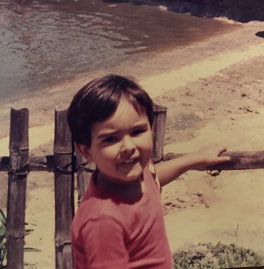
A Lesson Learned
The effects of poverty in our student population, courtesy of life’s curveballs and The East Texas Human Needs Network
By Pedro Tamez, English Teacher at Holloway Sixth Grade School, Whitehouse ISD
As a child, I had no idea that my family lived in poverty. Growing up watching my parents pinch pennies, plan months ahead for things like school supplies, shopping for clothes at the church clothes closet, and family vacations consisting of picnics at the neighborhood park seemed normal and shaped my worldview. We never had anything in abundance, more...
The effects of poverty in our student population, courtesy of life’s curveballs and The East Texas Human Needs Network
By Pedro Tamez, English Teacher at Holloway Sixth Grade School, Whitehouse ISD
As a child, I had no idea that my family lived in poverty. Growing up watching my parents pinch pennies, plan months ahead for things like school supplies, shopping for clothes at the church clothes closet, and family vacations consisting of picnics at the neighborhood park seemed normal and shaped my worldview. We never had anything in abundance, more...
| poverty_floor_plan.pdf | |
| File Size: | 58 kb |
| File Type: | |

